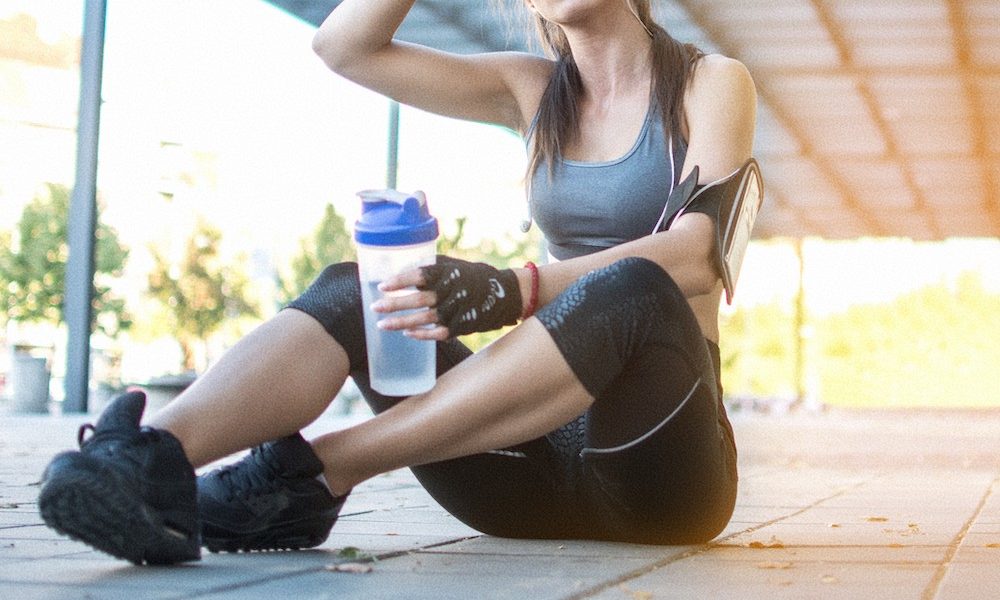Cooling off while you train outdoors can be challenging when you’re stuck in hot humidity. Here are some expert tips to keep hydrated and maintain your performance.
BY: MARITA RADLOFF, MS, RDN, CSSD, LD
Whether you’re training for a 5K, marathon, or getting active with the kids, summer is the perfect time to dial in your hydration plan for warm weather activities.
And while training and enjoying the warm weather is a true pleasure, heat and humidity can negatively impact your performance and even be dangerous.
It’s easy to become progressively dehydrated, even in moderate conditions of 70 degrees with high humidity. If you are working out, it becomes even more difficult to stay hydrated since your core temperature increases while your heat production is high. When you are active outside, your body deals with the heat of the environment as well as the heat produced by your muscles.
In fact, over two-thirds of the energy produced by your muscles during a workout is lost as heat.
One of the body’s reactions to cool it down is to send more blood to your skin, leaving less oxygen-rich blood for your muscles. Your body also increases sweating to remove heat from your body through evaporative cooling. This makes you gradually more dehydrated, which means less blood goes to your hard-working muscles, making your workout feel much harder than it should be.
If you live in a climate that has both heat and humidity, it’s important to be extra vigilant if you work out outside and are dehydrated. Humidity means that there’s high moisture content of the air, which means the sweat that you’re producing rolls off your skin onto the ground rather than cooling you off through evaporation.
That means all that hard-earned sweat isn’t cooling you off at all as you continue building heat in your body and your core temperature keeps increasing. With this stress to the cardiovascular system, performance is compromised. In fact, research suggests that performance is reduced by about 2 to 3% for each one percent loss in body weight due to hydration.
So how can you prevent dehydration?
The first step is to ensure you are well-hydrated before workouts and outdoor activities. When you are thirsty, you are already mildly dehydrated, so this is a good indicator of your hydration status.
However, you don’t want to wait until you are already dehydrated to start drinking. A better indicator is the color of your urine. Drinking until your urine is lightly colored ensures you are well-hydrated. You also should be urinating every two to four hours throughout the day.
A good formula to use for water intake? Take half your weight and drink that number in ounces. i.e. if you are 160 lbs, drink 80 oz of fluid per day. You can count water, unsweetened tea or coffee, smoothies, and soups as hydration!
So what about hydration during workouts?
If you are going outdoors for a workout, drink 16 oz one to two hours before exercise to ensure you are adequately hydrated. This also gives your body enough time to excrete excess fluid, so you don’t have to take a potty break during your workout!
However, if you plan to workout for more than an hour outdoors, you need a hydration plan. Here are a few tips:
- For longer workouts, consider switching from water to a sports drink that contains a mixture of electrolytes, carbohydrates and fluids to meet your hydration needs. Ideally, a sports drink contains at least 200 mg of sodium and 15-20 g of carbohydrates per every 80-120 calories.
- A good rule of thumb is to sip from your sports drink bottle every 10-15 minutes starting within the first 15 minutes of exercise. This will ensure that you will stay hydrated, rather than getting dehydrated during your workout.
- Take at least 3 to 4 gulps to ensure you are getting around 3-4 ounces of fluid. Your stomach can empty about 5 to 7 ounces of fluid every 15 minutes, so don’t drink half your bottle at once! Otherwise, you might have an uncomfortable sloshing feeling in your stomach.
Now that you’re done with your workout, how do you rehydrate?
If you are working out on a hot day, you may sweat out three to four pints of fluid per hour. Since your goal is to only drink half that during your workout, you will end your workout somewhat dehydrated.
Be sure to rehydrate with 16-24 oz for every pound of water lost to help you recover from your workout as quickly as possible. If you slack on rehydrating, this slows down your recovery because fluids help to remove waste products and bring nutrients to the tissues for repair.
Beyond working out, it’s important to stay hydrated for your everyday life. A mere 1% dehydration level can cause drowsiness, irritability, loss of concentration, and headaches. When dehydration increases, your health can be seriously compromised, affecting the brain, heart, muscles and organs.
So make sure to drink up, and keep your body healthy and strong!
Adapted from the original article.
Marita Radloff, MS, RDN, CSSD, LD is a Board Certified Sports Dietitian teaching athletes how to fuel for their sport without restrictive diets. Marita believes everyone is an athlete, no matter the level of fitness. She strives to teach athletes how to fuel for performance, recovery, and endurance while still enjoying the foods they love without the confines of a diet. You can find and connect with her at Marita Radloff Nutrition.

